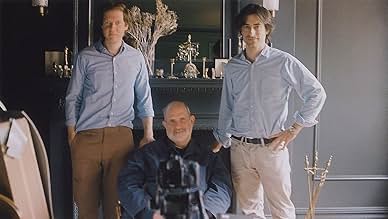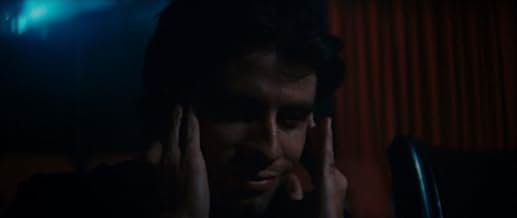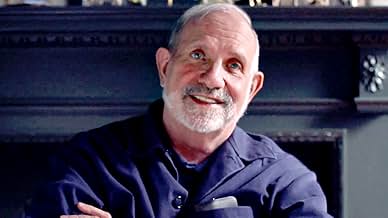AVALIAÇÃO DA IMDb
7,4/10
6,5 mil
SUA AVALIAÇÃO
Adicionar um enredo no seu idiomaA documentary about writer and director Brian De Palma.A documentary about writer and director Brian De Palma.A documentary about writer and director Brian De Palma.
- Prêmios
- 1 vitória e 4 indicações no total
Mark Hamill
- Self
- (cenas de arquivo)
Amy Irving
- Self
- (cenas de arquivo)
Kurt Russell
- Self
- (cenas de arquivo)
Sissy Spacek
- Self
- (cenas de arquivo)
Steven Spielberg
- Self
- (cenas de arquivo)
Angela Bettis
- Carietta 'Carrie' White
- (cenas de arquivo)
- (não creditado)
Jill Clayburgh
- Self
- (cenas de arquivo)
- (não creditado)
Clarence Clemons
- Self
- (cenas de arquivo)
- (não creditado)
William Finley
- Winslow
- (cenas de arquivo)
- (não creditado)
- …
Vincent Gardenia
- Doctor Byrd
- (cenas de arquivo)
- (não creditado)
Don Harvey
- Clark
- (cenas de arquivo)
- (não creditado)
Annette Haven
- Self
- (cenas de arquivo)
- (não creditado)
Gale Anne Hurd
- Self
- (cenas de arquivo)
- (não creditado)
Holly Johnson
- Singing Nightclub Doorman
- (cenas de arquivo)
- (não creditado)
Alan King
- Arthur Ruskin
- (cenas de arquivo)
- (não creditado)
Avaliações em destaque
Brian De Palma is one of those directors whose films are very polarizing (with a few exceptions, of course). Being that he no longer works within the Hollywood establishment and his output has been drastically reduced, I guess a documentary will have to do. And boy, what a documentary! Still, the word 'documentary' doesn't really describe this film that well, since it's more like a one-on-one conversation. De Palma is very candid about his past and doesn't shy away from emphatically stating his opinions on people he's worked with and his own work. One thing that did surprise me was how little Hitchcock, his clearest influence, was brought up. Not a criticism, just an observation. Clips from VERTIGO, NORTH BY NORTHWEST, and REAR WINDOW are shown, though, in the context of techniques or stylistic features that De Palma learned from them. If anything, the range of artistic influences was much wider than I had ever realized before. Even if he never made another film, De Palma has left behind an incredible body of work that deserves serious study and consideration, and this documentary fills a void for everyone. It provides a nice retrospective for those already familiar and, for those not, a great place to start.
In this film, Noah Baumbach and Jake Paltrow interview one of Hollywood's most polarizing directors in Brian De Palma. De Palma has been praised for his innovative camera techniques and his suspenseful stories but has been criticised for misogyny in his films as well as seemingly ripping of many "Hitchcockian" traits. I am familiar with De Palma's work, although I haven't seen too many of his films apart from his most well known ones (Scarface, Untouchables, Carlito's Way etc.) but this documentary certainly wants me to explore more of his movies. The film is mainly just one shot of De Palma talking to the camera intercut with scenes from many of his movies. He goes into extreme detail about every single one of his movies, whilst occasionally talking about aspects of his personal life.
De Palma is a very interesting character. He's eccentric and funny but also can be arrogant sometimes. However, as a director he is a great storyteller and talks about most of his movies in extremely intricate and interesting detail e.g. how he performed certain shots to how he dealt with many of the different egos on his set. If you're someone who isn't particularly interested in film, you'll probably not find too much enjoyment in this documentary. It really is a documentary for cinephiles (such as myself) or at least people who have some interest in the art of film making. I do sometimes wish the documentary would perhaps tap into more aspects of De Palma's personal life such as his childhood or his relationship with his peers (Scorsese, Spielberg etc.). There are moments when De Palma talks about his childhood and refers to incidents that impacted his voyeuristic style but I wish the movie tapped into more moments like these. One other criticism I also have is perhaps De Palma does tend to talk about certain movies more than other ones. I would've liked for him to go into more detail about some of his more notable failures like Mission to Mars and Passion but De Palma generally just skips over these particular films.
However, if you're a movie fan or Brian De Palma fan( hell, even a detractor) you'll find great enjoyment out of this fascinating documentary about one of Hollywood's most prolific directors.
De Palma is a very interesting character. He's eccentric and funny but also can be arrogant sometimes. However, as a director he is a great storyteller and talks about most of his movies in extremely intricate and interesting detail e.g. how he performed certain shots to how he dealt with many of the different egos on his set. If you're someone who isn't particularly interested in film, you'll probably not find too much enjoyment in this documentary. It really is a documentary for cinephiles (such as myself) or at least people who have some interest in the art of film making. I do sometimes wish the documentary would perhaps tap into more aspects of De Palma's personal life such as his childhood or his relationship with his peers (Scorsese, Spielberg etc.). There are moments when De Palma talks about his childhood and refers to incidents that impacted his voyeuristic style but I wish the movie tapped into more moments like these. One other criticism I also have is perhaps De Palma does tend to talk about certain movies more than other ones. I would've liked for him to go into more detail about some of his more notable failures like Mission to Mars and Passion but De Palma generally just skips over these particular films.
However, if you're a movie fan or Brian De Palma fan( hell, even a detractor) you'll find great enjoyment out of this fascinating documentary about one of Hollywood's most prolific directors.
10ujtc
This interview/documentary on Brian DePalma's work is completely fascinating - it's not bloated with expert perspectives or critical assessment of DePalma's work. Rather we get an unfiltered story from the director himself which works its way through the last 50 years of cinema and discusses in much candor the highs and lows of a directing career. Particularly compelling are the practical steps DePalma took to stay relevant in a rapidly changing industry, as well as his pragmatic approach of dealing with hard-nosed movie executives, difficult actors and minuscule budgets. Throughout the DePalma's interview narrative is supplemented with clips from his own movies as well as other contemporary pieces, which convey the story line brilliantly. The documentary was filmed over the course of a view days based on dinner- time conversations between DePalma and Bombauch/Paltrow. Wonderful editing, amazing perspective; a must-see for any film lover or aspiring director.
Yes, he made some good movies, but he made some very average and awful movies. Most of the time I felt I was watching movies that were too clinical, no emotions to them. Which is odd, considering the subject matter and violence to them. DePalma seemed to be more interested in creating something that was a lesson in cinematography, rather than tapping into your connection to the story or the characters. This documentary shows that. I felt he was giving a class in movie making, which most of his movies seem to be like. I never had the emotional pull like I have with The Godfather, American Graffiti, Saving Private Ryan, Taxi Driver, or Bonnie and Clyde. I cared about the characters; I cared about the stories; when I got to the end of the movie, I didn't want it to end. ThT is missing in 90% of DePalma movies. He fails to make the emotional connection with his audience and he doesn't seem to realize that audiences what an emotional connection.
You know, I went into this experience thinking I what was a big fan of De Palma, but was really cool is, I knew nothing, but learned a lot.
I was expecting this movie to be all about Carrie, the Untouchables, Mission Impossible, but for those of us who De Palma became a big name for because your of the generation that group up with Hip hop artist who loved Scarface, that movie and many of his mainstream hits play an important part in this sit down interview, but a small one, as De Palma talks with great personal depth a careering touching 50 years.
He's tells the story from his perspective and it's told with an honest feel, and it gives you perfect insight on his film style. He's a guy who loves indie films for the freedom it allows but needed to prove to himself that he can make a mainstream hit. He defends his disturbing images, by revealing to us how he did not realize it was disturbed.
Though focus on his movies, De Palma does give you personal insight on his upbringing and the state of mind he was in when he made those movies (like during the early 80s when he constantly cast his then wife, Nancy Allen, which he knew as damaging to their relationship).
A few times in the film, his treatment of women in his films came up and once again this is where his honesty of what he was trying to do came up. The interview is intertwine with clips from his movies and other movies that inspire him, and I think every nude scene De Palma has ever filmed was used here. Another contemporary subject was War in which he was able to give his two cents on what's going on now by talking about the two war movies he did do.
It's a great sit down for not just De Palma fans but for film fans everywhere. The man was enjoyable to listen to for almost two hours and he told great stories about the development for his long list of film credits.
Now I have to go out and find the movies I never seen.
I was expecting this movie to be all about Carrie, the Untouchables, Mission Impossible, but for those of us who De Palma became a big name for because your of the generation that group up with Hip hop artist who loved Scarface, that movie and many of his mainstream hits play an important part in this sit down interview, but a small one, as De Palma talks with great personal depth a careering touching 50 years.
He's tells the story from his perspective and it's told with an honest feel, and it gives you perfect insight on his film style. He's a guy who loves indie films for the freedom it allows but needed to prove to himself that he can make a mainstream hit. He defends his disturbing images, by revealing to us how he did not realize it was disturbed.
Though focus on his movies, De Palma does give you personal insight on his upbringing and the state of mind he was in when he made those movies (like during the early 80s when he constantly cast his then wife, Nancy Allen, which he knew as damaging to their relationship).
A few times in the film, his treatment of women in his films came up and once again this is where his honesty of what he was trying to do came up. The interview is intertwine with clips from his movies and other movies that inspire him, and I think every nude scene De Palma has ever filmed was used here. Another contemporary subject was War in which he was able to give his two cents on what's going on now by talking about the two war movies he did do.
It's a great sit down for not just De Palma fans but for film fans everywhere. The man was enjoyable to listen to for almost two hours and he told great stories about the development for his long list of film credits.
Now I have to go out and find the movies I never seen.
Você sabia?
- CuriosidadesPaltrow and Baumbach filmed Brian De Palma for one week in 2010, collecting about 30 hours worth of interview footage. De Palma, sitting in Paltrow's living room and talking about his career, wore the same shirt every day for continuity's sake. But the movie ended up premiering in 2015 and the director made another movie years after the interview, which explains why when he talks about Passion the viewer only hears his voice but doesn't see him talking.
- Erros de gravaçãoFemme Fatale (2002)'s release date is incorrectly listed as 2000, both in the body of the film and in the end credits.
- Citações
[repeated line]
Brian De Palma: Holy mackerel.
- ConexõesFeatures O Fantasma da Ópera (1925)
- Trilhas sonorasDe Palma (Main Title Theme)
Written by Nathan Johnson
Courtesy of Choplogic Music
Under license from Nathan Johnson
Principais escolhas
Faça login para avaliar e ver a lista de recomendações personalizadas
- How long is De Palma?Fornecido pela Alexa
Detalhes
- Data de lançamento
- País de origem
- Central de atendimento oficial
- Idioma
- Também conhecido como
- Де Пальма
- Locações de filme
- Empresa de produção
- Consulte mais créditos da empresa na IMDbPro
Bilheteria
- Faturamento bruto nos EUA e Canadá
- US$ 165.237
- Fim de semana de estreia nos EUA e Canadá
- US$ 30.355
- 12 de jun. de 2016
- Faturamento bruto mundial
- US$ 168.045
- Tempo de duração
- 1 h 50 min(110 min)
- Cor
- Proporção
- 1.85 : 1
Contribua para esta página
Sugerir uma alteração ou adicionar conteúdo ausente













































